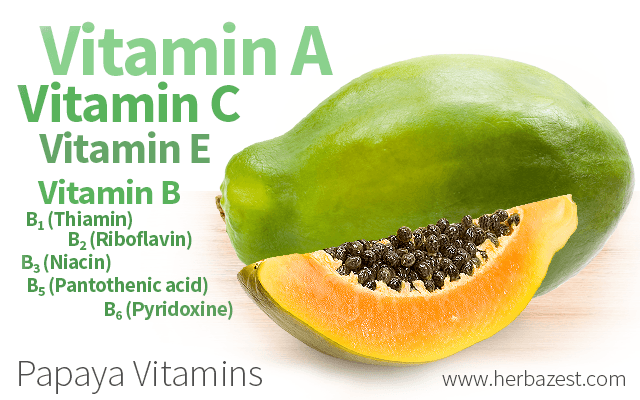Papayas are rich in essential nutrients the body requires to maintain healthy function. Although many others are present, some of the most important vitamins in papaya are A (as beta-carotene), C (ascorbic acid), and E (alpha-tocopherol). They serve as important medicinal agents with antioxidant and cellular-protective actions in the body, responsible for many of papaya benefits.
Papaya Vitamins and Daily Requirements
Papaya's vitamins C and E are two of the most important nutrients in fresh, raw fruit, working synergistically to provide powerful antioxidant support by protecting the body from naturally-occurring cellular damage. Not only do these vitamins support the immune system and cellular healing, but they are also thought to prevent the formation of several disease-rendering pathogens.
A 100-GRAM SERVING OF PAPAYA INCLUDES NEARLY 75% OF THE RECOMMENDED DAILY INTAKE OF VITAMIN C AND 2% OF VITAMIN E.
The carotenoids in papaya are precursors of vitamin A, which plays an important role in promoting healthy vision, immune function, reproduction, and cellular communication. One small papaya fruit provides about 6% of the recommended daily intake of vitamin A.
Papayas also contain six B-group vitamins: thiamin (B1), riboflavin (B2), niacin (B3), pantothenic acid (B5), pyridoxine (B6), and folate (B9). Though not as significant as other vitamins in papaya fruit, they play an important role in energy metabolism, supporting healthy growth and development.
How to Make the Most of Papaya's Vitamins
The level of vitamins in papaya fruits vary according to their state of ripeness. While the B-group vitamins and vitamin A increase with maturity, the vitamin C in papaya is known to decrease as the fruit ripens.
Although papayas are most commonly eaten raw, many people also enjoy them in savory dishes. As it turns out, that isn't such a bad idea. Because vitamins A and E are both fat-soluble, serving papaya in a salad that is lightly dressed with vegetable or olive oil will help the body better absorb these nutrients.
Conversely, in order to take full advantage of the vitamin C, which is water-soluble, it is better to consume fresh, raw papaya in juices and smoothies.
While vitamins in papaya are abundant in the fruit's flesh, they can also be found in its skin and seeds. However, it should be cautioned that only small quantities of papaya seeds are recommended, and the skin is considered more or less unpalatable.
Vitamins in Papaya vs. Other Fruits
The content of vitamin C is without a doubt one of the most impressive papaya facts. Even though oranges are widely considered to be the best everyday source of vitamin C, papayas far surpass them: a 100-gram serving of oranges provides about 48.5 mg of vitamin C, while the same amount of papaya contains nearly 61 mg. Papayas also provide more vitamin C than mangos, pineapples, and tomatoes, thereby suggesting their possible superiority for immunization, collagen building, and protection from pollution.
On the other hand, a study cited in the British Journal of Nutrition (2014) found that vitamin A in papaya is three times more likely to be absorbed by the body than that found in tomatoes. However, papaya's vitamin E, though it works to prevent cardiovascular disease and other illnesses, is rather insignificant in comparison to tomatoes, which provide almost twice as much.
Rich in many essential vitamins that maintain the body's systems, papayas are an abundant source of nutrition. Furthermore, papaya's vitamins can lead to many positive results when combined with proper diet and exercise.
Sources
- Circulation, Six-year effect of combined vitamin C and E supplementation on atherosclerotic progression: the Antioxidant Supplementation in Atherosclerosis Prevention (ASAP) Study, 2003
- IOSR Journal of Pharmacy and Biological Sciences, Evaluation of nutritional components of Carica papaya L. at different stages of ripening, 2013
- National Health Service, Vitamin E | Thiamin | Riboflavin | Calcium | Vitamin A | Vitamin C | Folate
- National Library of Medicine, Vitamin A
- Natural Product Radiance, Review on nutritional, medicinal and pharmacological properties of Papaya (Carica papaya Linn.), 2008
- The British Journal of Nutrition, Carotenoids are more bioavailable from papaya than from tomato and carrot in humans: a randomized cross-over study, 2014
- USDA Nutrient Database, Tomatoes, red, ripe, raw, year round average | Mangos, raw | Papayas, raw | Oranges, raw, California, valencias | Pineapple, raw, all varieties
- University of Maryland Medical Center, Vitamin B5 (Pantothenic acid)
- Food and Drug Administration, Guidant for industry: A food labeling guide (14. Appendix F: Calculate the percent daily value for the appropriate nutrients)




